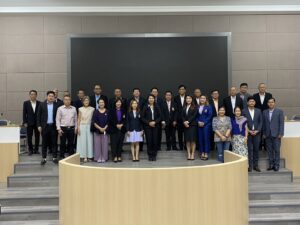[ad_1]
KUALA LUMPUR, April 23 — A total of 4,500 film industry practitioners will receive full sponsorship for their Social Security Organisation (Socso) contributions for a year under the Self-Employment Social Security Scheme (SKSPS).
Minister of Human Resources Steven Sim said the proactive step through a collaboration between Socso and the National Film Development Corporation of Malaysia (Finas) through the Communications Ministry will be able to address practitioners who were left out from social security coverage.
“The contribution to the SKSPS will be able to act as the best buffer against any unforeseen incidents that may hinder the filming sector’s practitioners.
“Finas agreed to outline the prerequisites for registration and contribution to Socso for film artists as most artists work on project basis, regardless of time, increasing the risk of accidents at work,” Sim said during the memorandum of understanding (MoU) signing ceremony between Socso and Finas here.
Advertisement
He said the MoU between Socso and Finas will improve the welfare of and protect all film industry practitioners who are still active and allow them to get Socso protection.
“In addition to film artists, the Human Resources Ministry through Socso hopes that other artists who are piecemeal, show producers, singers and influencers as well as creative arts industry associations involved under the arts sector will also make a contribution to Socso, to protect their jobs,” Sim said.
To date, he said 3,120 individuals from the arts sector in Malaysia are active contributors to the SKSPS as of April 12.
Advertisement
Communications Minister Fahmi Fadzil said during his meetings with arts industry activists, among many things, Socso and insurance were part of the discussions.
“The Communications Ministry through Finas took steps by introducing a ‘standard contract’ that will be used as a defence document and guide to address employee welfare issues.
“Thus, through the signing of the MoU today, we are not only able to help the practitioners make contribution (to Socso) but also encourage each of them to get protected through the SKSPS,” he said.
When responding to reporters’ questions during a press conference, Fahmi said the second phase of the scheme will look at the music industry.
“As mentioned by Steven earlier, this initiative will benefit 4,500 art activists with a contribution value of RM232.80 per year per person, whereby 90 per cent will be borne by the government while 10 per cent will be borne by Finas,” he said.
This sponsorship will be for a one-year contribution, after which Fahmi has encouraged industry practitioners to contribute.
[ad_2]
Source link




